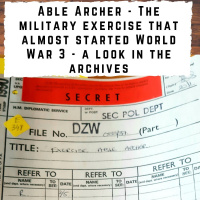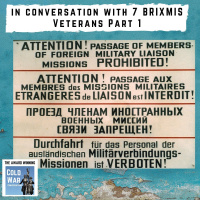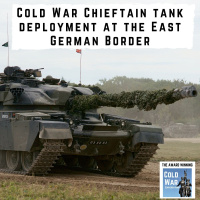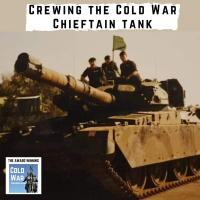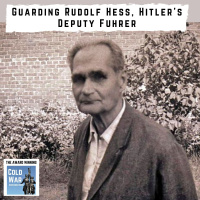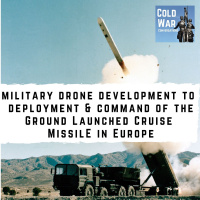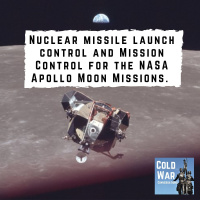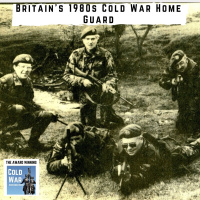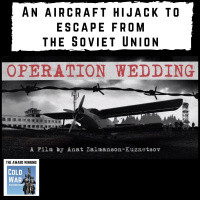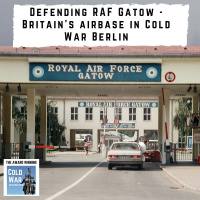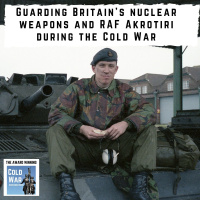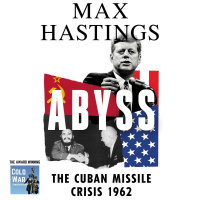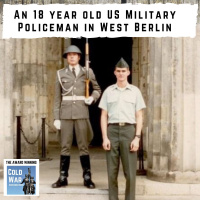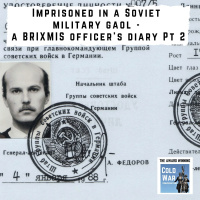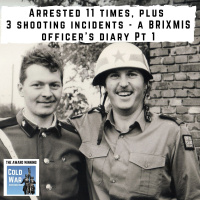Cold War Conversations
- Author: Vários
- Narrator: Vários
- Publisher: Podcast
- Duration: 356:41:49
- More information
Informações:
Synopsis
In conversation with those that experienced the Cold War and those who are fascinated.
Episodes
-
Able Archer - The military exercise that almost started World War 3 - a look in the archives (269)
31/12/2022 Duration: 51minIn 1986 Soviet Leader Mikhail Gorbachev said “Never perhaps, in the post-war decades has the situation in the world been explosive and hence more difficult and unfavourable as in the first half of the 1980s. “ He was referring to a period of immense tension between the Soviet Union and NATO when in 1983 a NATO exercise called Able Archer was believed to have almost accidentally started World War 3. We delve into the Able Archer archives to talk about the most recent documents with Francesca Akhtar, a researcher whose main research interests are US Cold War foreign policy, intelligence history and defence. Francesca has written a dissertation entitled “The most dangerous Soviet-American confrontation since the Cuban Missile Crisis?” An analysis of the origins, nature, and impact of the Able Archer 83 incident. 0:00 Introduction and context about Able Archer 1:07 Overview of Able Archer and its potential to start World War 3 2:15 Sponsor message and call for donations 3:19 The changes in Able Archer in 1983
-
In conversation with 7 BRIXMIS veterans - Part 1 (268)
28/12/2022 Duration: 01h06minIn October of 2022, I was asked by the West Pennines Military Vehicle Trust to moderate a Q&A session with a number of BRIXMIS veterans. Part 2 is here https://coldwarconversations.com/episode270 Attending were Drivers Neil Walton, Pete Curran, Dave Collins and Kev Smith, plus Sandy Saxton-Warne (Joint operations & weapons) , Mike Hill (Tour officer), Mike Corcoran (Weapons), and Dave Butler (Senior Non Commissioned Officer, Tourer). It was an amazing afternoon of reminiscing about their experiences and viewing the amazing collections they had from that time. Don’t miss part 2 which follows next week. My good friend Colin Dyter was a massive help with the recording, but a quick note that the audio is not up to the usual quality of Cold War Conversations, due to background noise, but I think the events and activities described definitely make it worth listening to. 0:00 Introduction and story from Dave Collins 5:25 Dave Collins recounts the night the wall came down 8:47 Neil Walton talks about their commun
-
Home Bases: Memories & Stories of US Military Bases in the UK (267)
24/12/2022 Duration: 01h11minSean Kelly is the author of Home Bases: Memories & Stories of US Military Bases Around London which for the first time, puts the spotlight on the history of many of the US Military’s lesser-known command and support bases that were located either in or close to London. The bases (often known as ‘Little Americas’) are furthermore brought to life in a series of ‘snapshot’ memories. We hear about the heroism of US personnel who were awarded the George Medal for bravery in rescuing people caught in the great floods of 1953 as well as including actor Larry Hagman who played JR Ewing in the TV series Dallas. We talk about the memories of bases further afield such as Upper Heyford, Greenham Common, Sculthorpe, and Burtonwood. 0:00 Introduction and background of Sean Kelly 1:59 Sponsor: Call for donations 2:23 Guest Introduction: Sean Kelly 7:38 Sean Kelly's book "Home Bases" and the history of US military bases in London 15:20 Personal stories from US military bases 28:31 Transformation and current state of Gre
-
Cold War Chieftain tank deployment at the East German Border (266)
17/12/2022 Duration: 59minWe’re back with Alan Hodges, a Royal Tank Regiment Chieftain tank commander, and Mick Hadfield who was his 17-year-old gunner. In this episode we talk in detail about their deployment within a kilometer of the East German border and their tasks should H Hour have come as well as emergency deployment from barracks. There is no affection for their main training area at Soltau described as “the moon with a few trees and also in less polite terms. However, these training periods are made better by the regular appearance of Wolfgang, a German entrepreneur and British Army legend who was uncannily able to place his snack vans whenever the British Army deployed. We also hear how the crew was also trained on how to evacuate the tank if it was hit as well as how to evade capture and resist interrogation. It’s anecdotes galore again including a visit from a Swedish Major who unwisely was given the chance to drive Chieftain. There’s also sadness as we remember those that never came back from exercises due to acc
-
Crewing the Cold War Chieftain tank (265)
10/12/2022 Duration: 01h07minAlan Hodges was a Royal Tank Regiment Chieftain tank commander and troop SGT in West Germany. Mick Hadfield was his 17-year-old gunner. The affection between the two is still apparent even today and Mick still calls Al his army Dad. Mick met Al in 1987 straight out of his armoured corp gunnery training at Catterick. They served for 3 years together in 1st Royal Tank Regiment in Hildesheim from August 87 to December 90. They share detailed insights into the operations of the Chieftain, the training, the camaraderie of a crew as well as important details like how you go the loo in a tank.. As part of 1st Royal Tank Regiment they were at the time (the most forward-facing Tank unit in BAOR and given a 2-hour life expectancy. They were told that if the Soviet 3rd Shock army crossed the border, each Chieftain would have to knock out a minimum of 10 Soviet tanks before they got overrun. 0:00 Introduction 4:07 Mick's journey into the army and Al's family military background 10:04 Experiences with the Chieftain M
-
How East Germany doped its athletes (264)
03/12/2022 Duration: 01h32sIn the early 1970s, the athletes of East Germany started to achieve incredible sports results, winning medals and setting new world records with astonishing frequency. For many years, their sporting supremacy was hailed as a triumph of the socialist government's commitment to scientific research and innovative training methods. However, after the Cold War ended, the Stasi archives revealed a sinister secret behind the successes: a perverse doping system imposed by the government itself. Drugs were administered to young athletes, often without their consent, and the price their bodies are now paying is very high, both physically and mentally. I talk with Joseph Tudor, whose new book Synthetic Medals reveals the events that led to the discovery of the state-doping system and the subsequent trial. It also explores the state's motives for this crime against its own people. 0:00 Introduction and Joseph Tudor's perspective on East German doping 2:04 Sponsor: Call to support the Cold War Conversations podcast
-
The building of the Berlin Wall (263)
26/11/2022 Duration: 01h15minFrom the moment East Germany was formed in 1949, many of its citizens chose to leave to start a new life in the West. By the mid-1950s, the trickle had turned into a flood as large numbers rejected Walter Ulbricht’s Communist paradise. His ‘Workers’ & Peasants’ State’ could not afford to lose the skills and productivity of these key workers, so he proposed a radical solution - to physically fence in the whole population. I speak with Andrew Long, the author of a series of books about Cold War Berlin as we explore the background and build-up to the building of the Berlin Wall, from the closing of the Inner German border to the momentous events of August 1961. We examine in detail how Operation Rose, the operation to close the border between East and West Berlin, was planned and executed and look at how the West reacted. 0:00 Introduction 1:04 Formation and Exodus of East Germany 7:51 Dissent and Exodus in East Germany 15:39 The Unique Situation in Berlin and the Establishment of Air Corridors 18:11 Khrushch
-
Guarding Rudolf Hess, Hitler's Deputy Führer (262)
19/11/2022 Duration: 57minDave Phillips is a Yeoman Warder at the Tower of London. The Yeoman Warders have been guarding the Tower since Tudor times. Dave joined the British Army aged 16 into the Royal Irish Rangers. We hear of his early years in the Army in Northern Ireland and his posting to West Berlin. In West Berlin Dave is part of the force that guarded Rudolf Hess, a leading member of the Nazi Party in Nazi Germany and appointed Deputy Führer to Adolf Hitler in 1933. On 10 May 1941, Hess made a solo flight to Scotland, where he hoped to arrange peace talks with the British. He was arrested and stood trial at the 1946 Nuremberg trials of major war criminals. The court convicted him of crimes against peace and of conspiracy with other German leaders to commit crimes and was given a life sentence in Berlin’s Spandau Prison. Dave describes interactions with Hess, as well as the guard duties and operation of the prison. 0:00 Introduction and Dave Phillips' early experiences in Berlin 1:04 The story of Rudolph Hess and his a
-
From Cold War military drone development, to the deployment and command of the nuclear armed Ground Launched Cruise Missiles (GLCM) in Europe (261)
12/11/2022 Duration: 56minWe continue the story of Richard Stachurski from the previous episode. Part 1 is here https://coldwarconversations.com/episode260 In 1971 Richard left NASA and was assigned to the Drone/Remotely Piloted Vehicle Systems Program Office at Wright-Patterson Air Force Base in Ohio. From 1975-1978 Richard did a tour of duty with the Air Staff at the Pentagon in Washington D.C. and between 1978-1981: he was Deputy Program Manager, Ground Launched Cruise Missile Program (GLCM) System Program Office-engaged in the adaptation of the Navy’s SLCM for use by the Air Force. In 1981 he was assigned to the staff at USAFE Headquarters (Ramstein Air Force Base, Germany) responsible for the deployment of the GLCM to five European countries (England, Germany, Netherlands, Belgium, and Italy). Richard was then promoted in 1984 to Vice Commander, Commander, 487th Tactical Missile Wing, Comiso Air Station, Sicily where he was responsible for the missile wing's operational readiness, and his troops' welfare. 0:00 Introducti
-
Nuclear missile launch control and Mission Control for the NASA Apollo Moon Missions (260)
05/11/2022 Duration: 54minRichard Stachurski joined the US Air Force in 1962, on the cusp of the Cuban Missile Crisis as a security police officer guarding nuclear-armed B-58 Hustler bombers. Within two years he volunteered for the Minuteman nuclear missile program where he served as a Deputy Missile Combat Crew Commander with the 68th Strategic Missile Squadron at Ellsworth AFB, South Dakota. Richard was the junior officer on a two-man crew in a launch control capsule buried beneath the South Dakota prairie who was charged with monitoring the status and launching if necessary ten Minuteman ICBMs. In 1965 he was selected as one of 128 Air Force officers to be loaned to NASA to support the activation and operation of the Manned Spacecraft Center in Houston, Texas. He worked his way up to being a Network Controller, who sat two consoles to the right of the Flight Director in the Mission Operations Control Room. He was responsible for all the ground systems that supported an Apollo mission and was selected as the lead Network Controll
-
Britain's 1980s Cold War Dads Army/Home Guard - The Home Service Force
28/10/2022 Duration: 57minThe Home Service Force or HSF was UK Prime Minister Margaret Thatcher's Cold War version of the World War 2 Home Guard. An almost forgotten unit, the HSF was established in 1982 and recruited from ex-regular Army, ex-territorial and ex-uniformed service personnel aged up to 60 years old. Its mission was to guard key points in the UK as the perceived threat from Warsaw Pact special forces increased towards the end of the Cold War. I speak with Richard Coles, who served as an officer in the HSF Company of The Honourable Artillery Company (HAC). He tells of the setup of the unit, the incredible characters he served with and details some of the exercises that he participated in. 0:00 Introduction and overview of the Home Service Force 2:38 Richard Cole's background and establishment of the Home Service Force 6:34 Recruitment and training process for the Home Service Force 13:51 Role and perceived threats of the Home Service Force 21:45 Diversity and roles within the Home Service Force members 29:12 Memorabl
-
An aircraft hijack to escape from the Soviet Union (258)
21/10/2022 Duration: 47minBack in the 1970s, migrating from the Soviet Union was an unattainable dream for many, particularly Jews wanting to leave for Israel. To leave the Soviet Union for another country, it was necessary to obtain exit visas. In practice, many people found them impossible to get. On the morning of June 15, 1970, 16 Soviet Jews who had been refused exit visas appeared at Smolny Airport near Leningrad to hijack a plane. They posed as a group going to a wedding — hence the name of the operation. The plan devised a year before the attempted hijacking, was quite straightforward. The hijackers would target a small aeroplane and book all the seats on it. They would commandeer the aircraft and leave the pilots unharmed on the landing strip, while one of the conspirators would take control of the aeroplane and fly it to Sweden. I speak with filmmaker Anat Zalmanson-Kuznetsov whose film “Operation Wedding” reveals the compelling story of her parents, the leaders of the group. 0:00 Introduction and background on Soviet
-
Defending RAF Gatow - Britain's airbase in Cold War Berlin (257)
14/10/2022 Duration: 50minTrevor Howie’s role at RAF Gatow was advising the Station Commander on Station defence during times of war, tension or terrorist threat as well as the defence of 26 Signals Unit at the Teufelsberg listening post. RAF Gatow’s western side was located right against the Berlin Wall which was clearly visible from the control tower. Beyond the Wall was the Döberitz training area for the Soviet and East German Army. Soviet jets regularly overflew West Berlin emitting sonic booms to underline the immediate threat from their forces. To gain intelligence about the opposition Trevor used the resident De Havilland Chipmunk aircraft to see across the Wall and observe the neighbouring Soviet and East German forces. He describes the defence plans and exercises such as Exercise Grizzly Bear where every member of the air station would have played a part in its defence. Trevor vividly describes how he heard that the Wall had opened on 9th November 1989. It’s a fascinating view of British forces in Berlin and their pl
-
Guarding Britain's nuclear weapons and RAF Akrotiri during the Cold War (256)
07/10/2022 Duration: 59minFollowing his RAF Regiment officer training Trevor Howie was posted to 34 Sqn at Raf Akrotiri in Cyprus, commanding C Flight. The RAF regiment was effectively the Royal Air Force’s infantry, providing ground defence for air operations. 34 Sqn had a dual role of providing defence at Akrotiri and in the event of war at RAF Wildenrath in Germany. Trevor vividly describes his time at Akrotiri, including terrorist threats and realistic anti-riot training exercises the enthusiasm of the Argyle and Sutherland Highlanders required a hospital ward to be kept available for casualties. In 1986 Trevor became involved in Nuclear Weapon Security training, where the training techniques he introduced were the subject of complaints. His service also includes stints at RAF Greenham Common where he describes providing support to the US nuclear-armed cruise missile deployment there. Don’t miss next week’s episode where Trevor is posted to RAF Gatow in West Berlin as the Station Regiment Officer, responsible for advising
-
The 1962 Cuban Missile Crisis with Sir Max Hastings (255)
30/09/2022 Duration: 01h01minThe 1962 Cuban Missile Crisis is reckoned to be one of the most perilous events in history, when the World faced a looming nuclear collision between the United States and Soviet Union. During those weeks, the world gazed into the abyss of potential annihilation. I speak with Sir Max Hastings whose new history Abyss: The Cuban Missile Crisis 1962 tells the story from the viewpoints of national leaders, Russian officers, Cuban peasants, American pilots and British disarmers. The period is brought to life with eye-witness interviews, archive documents and diaries, White House tape recordings, and top-down analysis. More than purely a focus on the 13 days of the crisis, the book provides context through the Cold War experiences of Fidel Castro’s Cuba, Nikita Khrushchev’s Russia, and Kennedy’s America. Among the areas we discuss are how Cuba became a crisis, the failure of intelligence on both sides, and those nail-biting Thirteen Days in which Armageddon beckoned. Buy the book and support the podcast https://a
-
“Houston, we’ve had a problem” interview with Fred Haise, Apollo 13 astronaut (254)
23/09/2022 Duration: 01h29minFred Haise was one of the three astronauts on the ill-fated Moon mission when a design fault caused an oxygen tank to explode mid-mission putting the Apollo 13 crew in mortal danger on April 13th, 1970. This was the seventh crewed mission in the Apollo space program and the third meant to land on the Moon. Now as you can imagine I’m genuinely excited to be speaking with one of the Apollo astronauts. Fred and I talk about his life and his almost accidental entry into flying. We cover his admission into the astronaut programme, the family impact, and as you can imagine go into some detail about his experiences on the Apollo 13 mission. Many of you will know of this mission via the Film “Apollo 13” starring Tom Hanks, and Fred shares his views on the film and corrects some of the inaccuracies. Buy Fred's new book Never Panic Early: An Apollo 13 Astronaut's Journey and support the podcast here https://amzn.to/3DvCRzN 0:00 Introduction 6:14 Fred Haise's journey to becoming an astronaut and role in Apollo 11 16:3
-
An 18 year old US Military Policeman in Cold War West Berlin (253)
16/09/2022 Duration: 01h15minRichard Blevins enlisted aged 18 in the US Army in March of 1987. He completed Basic Training & Military Police School training in July of 1987 and was posted to West Berlin as a United States Military Policeman. He describes his selection for Berlin duty while at Rhine-Main AFB in Frankfurt and his first journey across East Germany on the US Duty train to West Berlin. Richard’s first year consisted of patrol duties and combat training as well as serving at Checkpoints Bravo and Charlie as the assistant to the Non-commissioned Officer in Charge. He also got selected as a traffic accident investigator in 1988 where he would patrol with the West Berlin Police and respond to all car accidents involving US military, dependents, and civilian workers as well as West German nationals. Richard also describes how he heard the news on November 8th, 1989, that Erich Honecker had lifted all travel restrictions on East Germans starting at midnight. He is a close friend of Michael Rafferty who appeared in episode 13 w
-
A trip across Central Europe on a East German MZ motorbike (252)
09/09/2022 Duration: 43minMZ was an East German motorcycle manufacturer located in Zschopau, Saxony. The acronym MZ stands for Motorenwerke Zschopau GmbH (German for Zschopau engine factory). In the 1980s MZ was regarded by the British motorcycle press as producing ugly and old-fashioned (if worthy) motorcycles however, there was a hard-core set of UK fans who loved this relatively, cheap and easy-to-repair bike. Julian Howe was a big fan of the MZ bike. He tells of a bizarre honeymoon of fellow MZ club members which involved MZ bike fans from across the UK touring Western Europe and the Warsaw Pact Countries. From sharing drinks with border guards to being on the receiving end of CS gas in Krakow it’s a tour through late 1980s Europe on the back of a two-stroke MZ motorbike. 0:00 Introduction and background on MZ motorcycles 1:21 Call for donations and testimonial from a supporter 5:28 The journey begins - crossing the border into East Germany 11:26 Interaction with an East German border guard and reflections on environment 15:
-
Imprisoned in a Soviet Military gaol - a BRIXMIS officer's diary Pt 2 (251)
02/09/2022 Duration: 01h01minThis is the 2nd part of my interview with Lt Col. Stephen Harrison, MBE who served for two years as a full-time Touring Officer with BRIXMIS. The tours were hazardous three-man, vehicle-borne patrols collecting intelligence on the Warsaw Pact forces in East Germany for up to five days and nights over a series of four-month patrolling periods. In this episode, we hear of Stephen’s imprisonment in a Soviet Army gaol, following detention in a Soviet Army garrison town as well as East German and Soviet Army press coverage about his activities. Stephen’s speciality was using his language skills to engage and befriend opposition troops and thereby gaining valuable intelligence. He used to go into bars frequented by Soviet officers and recalls one particular drunken night in Potsdam.. We also hear about his visit to the infamous World War 2 prison camp of Colditz castle where he befriends the staff enabling other BRIXMIS tours to visit regularly. Stephen also shares details of the top-secret Operation Tomahawk, a
-
Arrested 11 times, plus 3 shooting incidents - a BRIXMIS officer's diary Pt 1 (250)
26/08/2022 Duration: 52minLt Col. Stephen Harrison, MBE served for two years as a full-time Touring Officer with BRIXMIS. These Tours were hazardous three man, vehicle-borne patrols collecting intelligence on the Warsaw Pact forces in East Germany for up to five days and nights over a series of four-month patrolling periods. They lived in the field and did not carry weapons while Soviet and East German troops were nearly always armed, and their ever-present sentries carried live ammunition. The Tours operated in the closest proximity to these hostile and aggressive Warsaw Pact troops whose orders permitted them to use whatever force necessary, including opening fire, to protect the property they are guarding. We hear in detail about Stephen’s experiences in these demanding and frequently dangerous situations, as well as how he used his language skills to engage and befriend opposition troops gaining valuable intelligence which made him a particular threat to the Soviets. Don’t miss part 2 here https://coldwarconversations.com/episode

